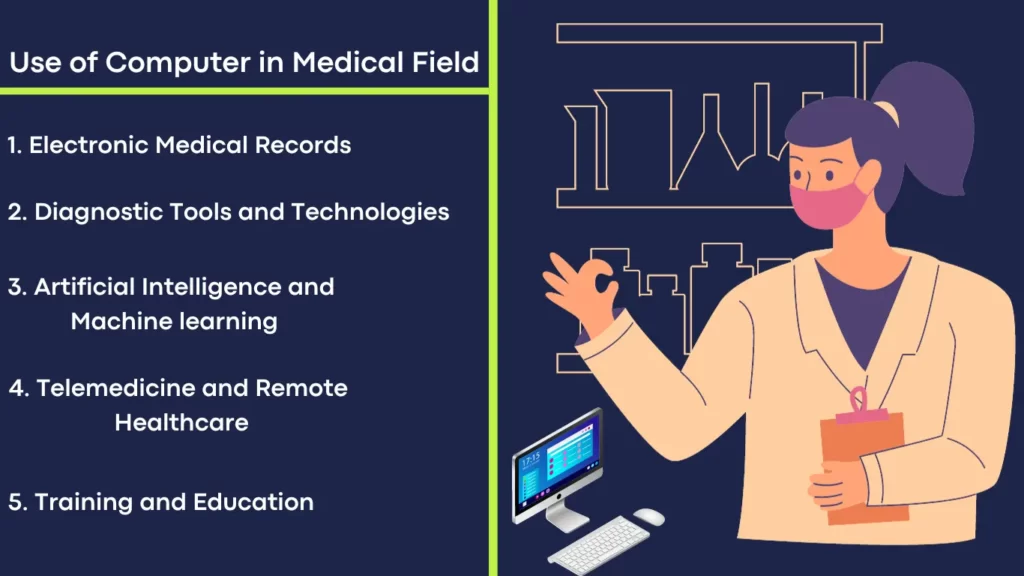Use of Computer in Medical Field: In the rapidly evolving field of medicine, computers have become an indispensable tool for conducting research. The use of computers in medical research allows for the analysis and interpretation of vast amounts of data, leading to groundbreaking discoveries and advancements in healthcare.

One area where computer applications have made a significant impact is in genomics research. The human genome consists of billions of base pairs, and analyzing this vast amount of genetic information would be impossible without the aid of computers.
By using sophisticated algorithms, researchers can identify genetic variations that may be associated with certain diseases. This knowledge can then be used to develop targeted therapies and personalized medicine.
Use of Computer in the Medical Field | Use of Computers in Medical Field
1. Electronic Medical Records
With the advent of electronic medical records (EMRs), healthcare providers can now access patient information with just a few clicks. EMRs have revolutionized the way patient care is delivered and have significantly improved patient outcomes.
EMRs also allow for real-time decision support, helping healthcare providers make more informed and evidence-based decisions. Through integrated clinical decision support systems, providers can receive alerts and reminders for preventive care measures, drug interactions, and potential diagnostic errors.
By aggregating and anonymizing patient data, researchers can identify trends, risk factors, and patterns of disease that can inform public health policies and interventions. EMRs have truly transformed the way patient care is delivered, making it more efficient, coordinated, and patient-centered.
2. Diagnostic Tools and Technologies
The use of computers in diagnostic medicine has revolutionized the way medical conditions are identified and treated. From advanced imaging technologies to computer-aided diagnosis systems, computers play a crucial role in the diagnostic process, leading to more accurate and timely diagnoses.
Technologies such as magnetic resonance imaging (MRI), computed tomography (CT), and ultrasound rely on computers to generate detailed images of the body. These images provide invaluable information to healthcare providers, allowing them to visualize and diagnose various conditions, ranging from fractures and tumors to cardiovascular diseases.
Computer-powered diagnostic tools have also played a crucial role in the early detection of diseases. For example, in the field of cancer diagnosis, computer algorithms can analyze medical images and identify suspicious lesions that may be indicative of cancer. This early detection allows for timely treatment and significantly improves patient outcomes.
3. Artificial Intelligence and Machine learning
Artificial intelligence (AI) and machine learning (ML) have emerged as powerful tools in the field of medicine, with the potential to revolutionize patient care and healthcare delivery. By mimicking human intelligence and learning from vast amounts of data, AI and ML algorithms can assist healthcare providers in making more accurate diagnoses, predicting patient outcomes, and personalizing treatment plans.
AI and ML algorithms can also be used to predict patient outcomes and personalize treatment plans. By analyzing large datasets that include patient characteristics, medical history, and treatment outcomes, computers can identify patterns and risk factors that may not be apparent to healthcare providers.
While AI and ML have the potential to revolutionize medicine, it is important to note that they are not meant to replace healthcare providers. Rather, they are tools that can augment and enhance the capabilities of healthcare providers, allowing them to make more informed decisions and deliver personalized care.
4. Telemedicine and Remote Healthcare
In recent years, telemedicine has emerged as a valuable tool in providing healthcare services remotely. With the advent of high-speed internet and advancements in communication technology, healthcare providers can now connect with patients in real time, regardless of geographical location.
Telemedicine has the potential to improve access to health care, reduce healthcare costs, and enhance patient outcomes. Through telemedicine, patients can consult with healthcare providers from the comfort of their own homes, eliminating the need for travel and reducing the time and cost associated with seeking medical care.
Telemedicine also has the potential to reduce healthcare costs by minimizing the need for hospital visits and unnecessary emergency room visits. By providing remote consultations and monitoring, healthcare providers can manage chronic conditions, provide preventive care, and address minor ailments without the need for in-person visits.
5. Training and Education
As computers play an increasingly important role in the medical field, it is crucial for healthcare professionals to have the necessary training and education to effectively use these tools. From medical students to practicing physicians, computer literacy and proficiency are essential skills that need to be integrated into healthcare education and training programs.
Medical students need to be equipped with the skills to navigate electronic medical records, use diagnostic tools and technologies, and analyze patient data using computer applications. As new tools and technologies are developed, healthcare professionals need to be trained on how to use them effectively and safely.
Conclusion: Use of Computer in Medical Field
Computers have become an integral part of the medical field, playing a crucial role in research, patient care, diagnostics, and education. From analyzing large datasets to assisting in the diagnostic process, computers have revolutionized the way medicine is practiced.
As technology continues to advance, we can expect to see even greater integration of computers in the medical field, leading to improved patient outcomes and a more efficient and effective healthcare system.
